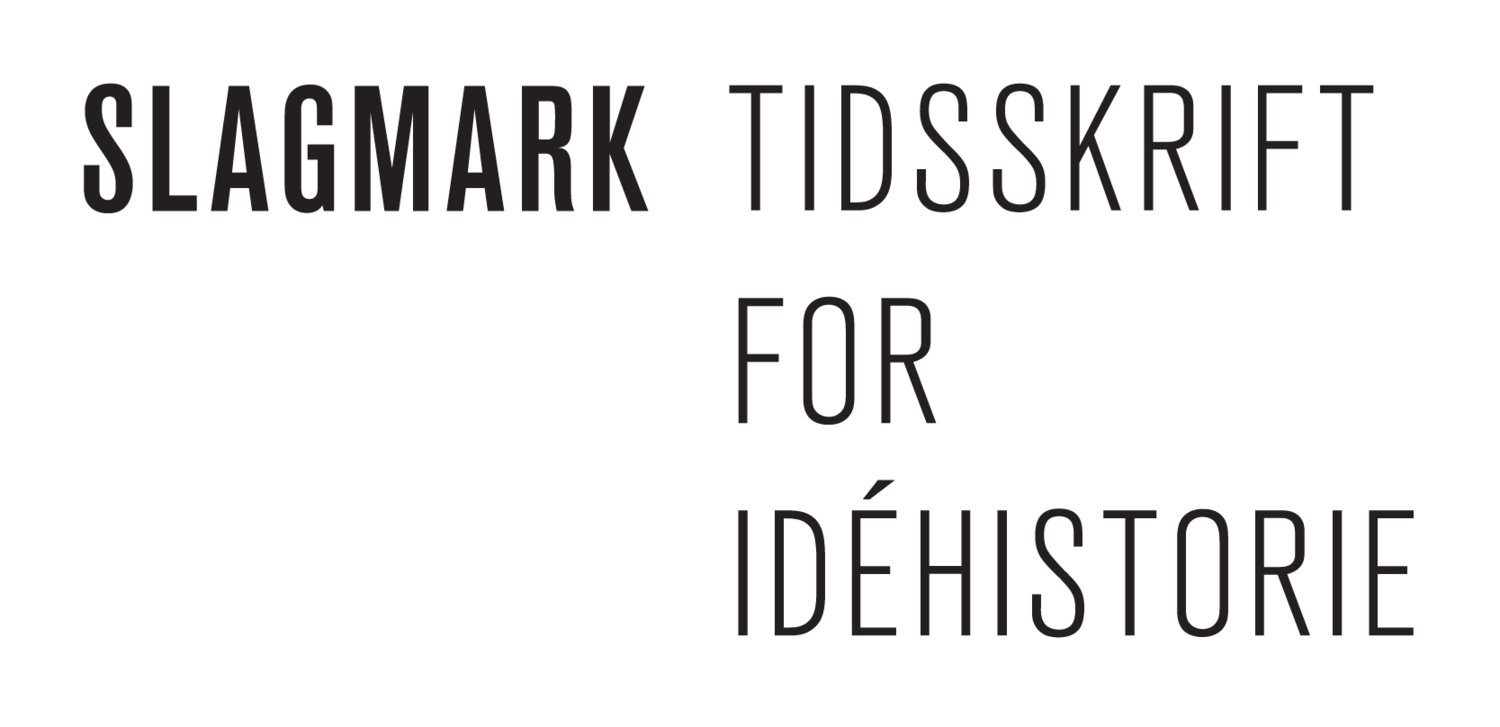ABSTRACTS, SLAGMARK #67
Frank Beck Lassen: The raison d’etre of the history of ideas
In his Essays the philosopher and writer Michel de Mantaigne argued, that "no propositions astonish me, no belief offends me, though never so contrary to my own; there is no so frivolous and extravagant fancy that does not seem to me suitable to the production of human wit. We, who deprive our judgment of the right of determining, look indiffferently upon the diverse opinions, and if we incline not our judgement to the, yet we easily give them the hearing." In the present article I am going to argue that the three protagonists of this dissertation have made a number of observations similar to that of Montaignes, albeit from different perspectives, regarding the uses of history. These observations I shall try to connect through the notion of 'denaturalisation' (afselvfølgeliggørelse). The value of history can be said to be about the alien charactor of history, and about all of the ways in which we no longer vies our societies. By studying past beliefs and convictions, we might be able to distance ourselves from the assumptions about our own time that we take for granted.
Keywords: history of ideas, intellectual history, historical method, value of history, historical practice
ROGER CHARTIER: HISTORY, TIME, AND SPACE
In this article the author reflects on the supposed ‘crisis of history’ which obsessed historians in the 1980s and 1990s. From these reflections the article seeks to provide answers to questions of ‘what history is’ between the definitions as narrative and knowledge. By analyzing the ideas of many intellectual historians such as Michel de Certeau and Reinhard Koselleck, Chartier contextualizes fundamental historiographical knowledge with more recent trends such as microhistory and globalism in order to arrive at a proposal of history as specifically capable of recognizing and articulating different times imbricated in historical moments.
Keywords: historiography, de Certeau, historical discipline
David Dunér: The Cognitive Turn: The history of ideas and the history of human thought
The last two decades have seen a noticeable increase in cognitive science studies that has changed the understanding of human thinking. Historians cannot ignore this any more. Cognitive history could be explained as the study of how humans in history used their cognitive abilities in order to understand the world around them and to orient themselves in it, but also how the world outside their bodies affected their way of thinking. In focus in this article is the relation between history and cognition, the human mind’s interaction with the environment in time and space. I will especially discuss certain cognitive abilities in interaction with the environment, which can be studied in the historical sources, and be put to the test, namely: embodied mind, situated cognition, perception, distributed cognition, conceptual metaphors, and communication. I also give concrete empirical examples of how a cognitive-historical analysis can provide more fundamental explanations for what happens in cultural encounters, when a human being meets another and tries to understand another culture or another foreign environment. By these cognitive theories we can come closer to an understanding of how (not only what) people thought, and study the interaction between the human mind and the surrounding world. The most ambitious aim of such a cognitive history could be, in the long run, to also inform the research on the cognitive evolution of the human mind.
Keywords: cognitive history, history of ideas, situated cognition, distributed cognition, metaphors
MIKKEL THORUP: TAKEN OUT OF CONTEXT - ON CONTEXT IN INTELLECTUAL HISTORY
The notion and practice of context is highly contested in intellectual history. But few have outlined and discussed its various levels and expressions for use in actual intellectual history research. This article provides a first mapping of the various different ways intellectual historians use contexualised readings dividing it up into four clusters of contextualizations: individual context, situational context, linguistic context, and finally cultural and social context. The article also discusses various criticisms of and interventions in the context debate arguing that context, whatever it may mean and however we choose to do it, is inseparable from any intellectual history practice
Keywords: Contextualism, Cambridge School, Intellectual history, historiography
MARK BEVIR: CONTEXTUALISM: FROM MODERNIST METHOD TO POST-ANALYTIC HISTORICISM?
This article provides a critical history of the Cambridge School of intellectual history. Laslett’s work on Locke appeared to vindicate modernist historicism. Laslett shunned the broad narratives of romantic developmental historicists. He relied on bibliographies, unpublished manuscripts, and other evidence to establish atomized facts and thus textual interpretations. Pocock and Skinner’s theories defended modernist historicism. They argued historians should situate texts in contexts and prove interpretations correct by using modernist methods to establish empirical facts. They attacked approaches that read authors as contributing to perennial debates or aiming at a coherent metaphysics. I argue we should reject modernist historicism with its methodological focus; we should adopt a post-analytic historicism focused on philosophical issues arising from analyses of the human sciences as studying actions by attributing meanings to actors and showing how these meanings fit into larger webs of belief.
Keywords: Contextualism, Quentin Skinner, John Pocock, methodology, historicism
DAVID ARMITAGE: WHAT’S THE BIG IDEA?
In many realms of historical writing, big is back. In some areas – historical archaeology, comparative sociology or world-systems theory – it never went away. In others, it clearly has disappeared, never to return: the globe-spanning universal histories associated with an Oswald Spengler or an Arnold Toynbee seem unlikely to be imitated again. But across the historical profession, the telescope rather than the microscope is increasingly the preferred instrument of examination. A tight focus has hardly been abandoned, as the continuing popularity of biography and the utility of microhistory both amply show. However, it is being supplemented by broad panoramas of both space and time displayed under various names: “world history”, “deep history” and “big history”. This return to the longue durée presents challenges and opportunities for all historians, including practitioners of intellectual history.
Keywords: Longue durée, Arthur O. Lovejoy, history of civil war, big history, intellectual history.

